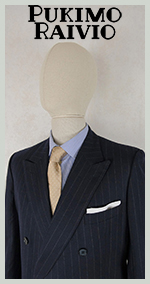Things That Have Interested Me by Arnold Bennett
0October 4, 2013 by Ville Raivio
Clothes and Men
Products from Pukimo Raivio
Ralph Lauren, Black Label suit, size 52EU
A continental reputation is something; and both the English male creature and the English male creature’s clothes have an enormous prestige on the Continent. At his physical best the Englishman is held to be without a rival in form, carriage, and distinction; and though some Scandinavians might well dispute this, not even Scandinavians would dispute his pre-eminence in the matter of attire. (I say nothing of his mental qualities, about which the leading continental races have their own views—to which they are doubtless entitled.)
For men’s clothes London is to masculine Europe what Paris is to feminine Europe. To be dressed in London is the ambition of youthful dandies from Calais to Bucharest; and the ambition persists, despite the effect of the singular attire which hundreds of thousands of Englishmen choose to display every summer in continental capitals.
Bond Street is supposed to be the chosen haunt of the well-dressed man. Well, I have had perhaps exceptional opportunities of inspecting the pavements of Bond Street on fine mornings in spring and autumn, when the latest fashions in suits appear on the most perfect male bodies in the civilised world. I have often issued out into Bond Street for the express purpose of regarding those suits on those bodies. And they made a very pleasing spectacle; and they engendered in myself the mad desire for perfection in dress, and I agreed that the continental reputation of the same was well deserved. Britain may not be able to win tennis championships, but the morning sights of Bond Street are still unrivalled.
And yet in Britain, just as in other countries, there is almost no public interest in male attire. The world’s greatest dressmakers advertise themselves freely in the papers (and indeed the papers would be a poor and a dull thing without their lovely and exciting proclamations), and they plant their establishments in prominent thoroughfares. But the world’s greatest tailors are generally content to hide themselves with the modesty of violets in streets known only to taxi-drivers; the supreme sartorial names, murmured with awe in the selectest clubs, never imprint themselves in the Press. No more would they dream of advertising than M.D.’s and K.C.’s would dream of advertising. The difference is that while K.C.’s and M.D.’s are forbidden to advertise and some of them privately yearn to advertise, the highest stars of tailordom are quite free to advertise—but don’t. There is some enigma here, to which the key is probably lost.
Of course some sartorial firms, and some good ones, do advertise; but their wares as a rule are specialities, such as collars and fur coats. It is curious that the illustrated wearer of the former is a type of young man with a strong chin but apparently brainless, and the illustrated wearer of the latter is a type of old, haughty roué who looks as if he may have had a considerable past in the matrimonial courts. At any rate, male attire is not advertised to the one-thousandth part of the extent to which female attire is advertised.
One reason for the lack of public interest in men’s attire is of course the undeniable fact that men dislike to do or be anything characteristically feminine. Women will imitate men, but men will not imitate women. Hence men keep quiet about their clothes. The dandies, or the merely well-dressed among them, will put themselves to an immense amount of trouble and expense over clothes, and then make their appearance with a deliberately casual air as though nothing on earth had happened. Save in the strictest secrecy they will never discuss their raiment. They are content with a silent appreciation of their wonderful achievements.
But there is another reason for the lack of public interest in men’s attire. Not merely do we rightly despise the fop—the man who lives for clothes—but we have a prejudice against the man who shows any sustained interest in his dress. (Such prejudice may be a remnant of Puritanism—I believe it is.) And we rather admire the man who will not go to the tailor’s until he is dragged thither by his wife. With this prejudice and this admiration I have no sympathy, and I hope that both are dying out.
I would sooner see a fop in the street than a man whose suit ought obviously to have been sold or burnt last year but one. The fop has at least achieved something and is not an eyesore. The scarecrow is an eyesore and has simply left something undone, either from conceit or from sloth. The fop is not without his use in society. He keeps tailors alert. He sets the pace. He may often be an ass, but he is also an idealist, a searcher after perfection; we have none too many searchers after perfection, and an ass engaged in that quest is entitled to some of our esteem.
The man who for any reason—affectation, idleness, self-esteem—despises clothes and the fashions thereof, implies thereby that fashion is absurd and negligible, and that the sole purpose of clothes is to give a decent and comfortable protection against climatic conditions. This argument cannot possibly be maintained. Fashion is neither absurd nor negligible. It is one of the most powerful influences upon human conduct, an influence which nobody can escape. Artists, for instance, will flout fashion, but only some fashion; they are the slaves of their own fashion. And non-artists who flout fashion in clothes are always the slaves of fashion in some other article—such as tobacco, politics, newspapers.
Further, the sole purpose of clothes—whatever it once may have been—is no longer merely to give protection. An important purpose of clothes is to make a pleasing visual impression—partly on oneself but chiefly on other people. This is unquestionable. Why, therefore, should it not be candidly admitted?
The importance of being well dressed, while not being a dandy, is strongly insisted on in certain professions and callings; and a carefully dressed man will always have the advantage over a carelessly dressed man in beginning business relations. The first thought of a negligent man seeking a situation is invariably to remedy his negligence; the pity is that sometimes he cannot remedy it.
Platitudes, you will say. They are; but it is astonishing how the most obvious platitudes are ignored by seemingly sensible persons in daily life.
The negligent man will object that he cannot afford to dress well. Not so. Every one can afford to dress well on his own plane of expenditure. It is a matter not of money but of interest in the subject. He who is interested in a subject will speedily acquire taste in that subject, and the skill to get the best effect at the lowest cost. Nine out ofevery ten of us could easily produce a better effect on the eye of the beholder than we actually do without spending a penny more than we habitually spend.
We are guilty of a number of errors and omissions, the chief of which I will enumerate.
First.—We won’t take trouble. A great living statesman is reported to have said: “I put on the first things that come to hand, and people don’t seem to mind.” This is the practice of many of us, but it is no way to dress. People do mind.
Second.—We forget that dress comprises much more than a suit of clothes. If a man went forth in a suit of clothes and nothing else, he would make a sensation which might seriously incommode him. There is no sense in procuring a good suit of clothes unless all the rest of the attire from hat to heels harmonises with it, not merely in colour but in style and excellence. Clumsy boots will make the finest suit look ridiculous. How often one has the misfortune to see a man who has used brains and taste in matching shirt, necktie, and socks with his suit, but whose exposed handkerchief produces on our teeth the effect of scratching a coin on a slate. Such men ought to be fined forty shillings or go to prison.
Third.—We place ourselves like dolls in the hands of our tailors or other furnishers. We let them work their will upon us. We accept submissively their often ill-founded assertions that everything is all right. Tailors, for instance, are human, and want overseeing. The price of smartness is eternal vigilance. And is there a tailor in the land, save one or two whom I have personally intimidated, who does not proceed on the assumption that pockets are ornamental and not intended to hold things? Suits ought to be finally tried on with everything in the pockets that the pockets will have to contain. If the suit does not fit then, the suit is wrong. Here we have the divine male institution of the pocket—and tailors conspire to render it monstrous!
Fourth.—Having got our clothes, we do not take care of them. We treat them like step-children. Of course courage as well as true affection is needed for the just treatment of clothes. It takes a brave man to press his trousers on a frosty night.
Fifth.—We do not put our clothes on properly. I defy you to walk a hundred yards along the Strand or Fifth Avenue without seeing a man the collar of whose coat sticks up above the collar of his overcoat—except in summer, when his overcoat is left lying huddled in the wrong creases at home.
~ Arnold Bennett in Things That Have Interested Me, Third Series, London, Chatto and Windus (1926)
Category British Style, Reading | Tags:



Leave a Reply